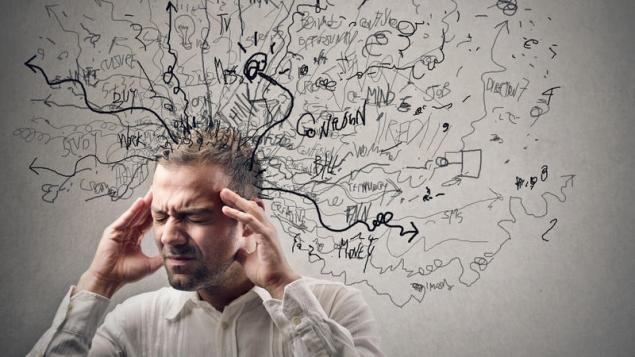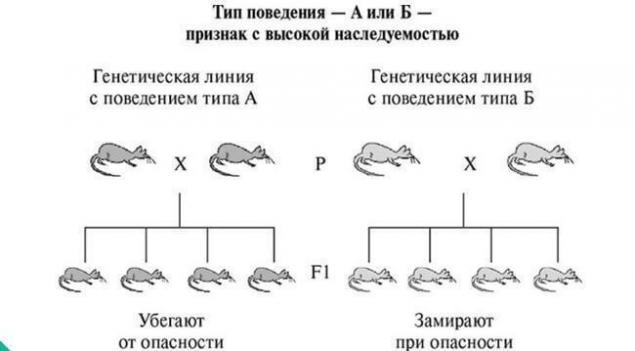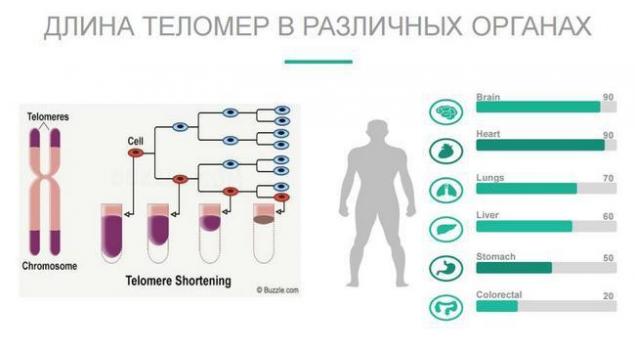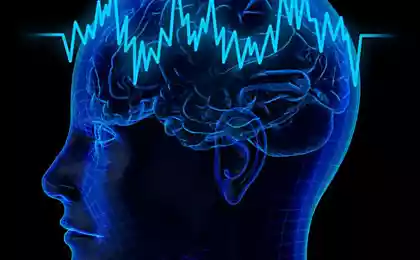759
The main cause of accelerated aging of the human body
A wrong response to stress accelerates the depletion of the body. How to learn to manage emotions and avoid premature aging?
What is stress? Scientists have been trying to define this psychological state of man. Oddly enough, it was a stressful situation helped our ancestors to survive in complex natural environments. For example, at the moment of predator attack the caveman experienced all of the stages of stress — from stupor to deciding how not to become dinner.

The modern world creates a lot of stressful situations, so their influence is increasingly concerned not only specialized experts, medical professionals and geneticists, but also ordinary people.
What is stress, how it affects the duration of human life and how to deal with its negative consequences?
A bit of theory
Russian ENCYCLOPAEDIA on Osh says that stress is a state of tension. It occurs in humans (and animals) under the influence of strong environmental influences. Canadian scientist Hans Selye, author of the concept and term "stress", believed that this is a common reaction to any claim brought against him. Through research, he concluded that when human exposure as extreme (physical: heat, cold, trauma, etc.) and mental factors (risk, conflict, joy) in his body, there are similar biochemical changes. With their help people struggling with stressors and gradually adapts to them (adaptation syndrome).
How the stress?
Specific reaction to novelty — one of the definitions of stress. All people have developed their own complex reactions to stress, and everyone has different. Previously people thought how not to become dinner for a predator, and now — how to survive in the urban concrete jungle. In addition, there are always other factors of everyday life that are stressful and depressing us.
Whether there is stress, really?
Stress as such does not exist. There is a reaction to the problem or the environment.
Interesting fact: reactions to stressful situations are divided into two types - A and B. They are placed in the human body genetically and cannot be changed or educate (inherited).

Stages and phases of stress
From stress there are certain stages and phases.
Stage of alarm. For example, you have dropped out of hands phone. You haven't fully realized the fact of the fall, but have already decided that all is lost, and automatically falling into prostration. After a few seconds you feel new inflow of forces and try to find a way out of the situation — the stage of resistance. But after a while forces you to leave, and the body goes into the stage of exhaustion.
Depression as a continuation of the reaction sathawane
Depressive disorder — an extreme form of stivania that occurs in people with type response to stress V. to exit a stressful situation, they "lay low" and try to be invisible to others. Very often it becomes a habit and turns into adaptive reactions of the organism.
Signs of depression:
One of the reasons of aging
The body ages, and it is an inevitable fact. One of the main causes of aging — the constant division of cells of living organisms, which occurs a number of times. Through this process all living organisms are different from each other in appearance and life expectancy.
The number of divisions you can calculate with the help of telomeric repeats (certain end of DNA molecules that "tell" the cell how many divisions it has already passed and how much is left). When a cell divides, automatically, and shortened telomere length. And after 60-70 divisions they finally are depleted, and chromosomes fail to fulfill their functions.
Interesting fact that we have from birth laid its telomere length. If you remove all stressful situation, then it can be up to a month to determine the length of life of each person. The older the organism, the shorter the length of its telomeres. And in the body in which telomere length before the other reaches a critical limit, starts the pathological process.

Factors accelerating the reduction of telomere length:
Stress is an impact on the aging process and telomere length: the more we strasserwirt, the less we have the sequence of the telomere and the faster we age.
Factors that prevent premature aging at the cellular level:
Stress and aging
In many seminars, the speakers are trying to tell you what stress is and how dramatic the consequences it may bring. Everything is much more complicated. Stress is not only bad appearance, but also the main cause of accelerated aging of the human body.
There is a science — gerontologythat studies the biological, social and psychological aspects of human aging. Gerontologists try to understand why different people age differently, and each has its own life expectancy. In many studies, scientists came to the conclusion that the aging process of cells and the whole body speed constant stress. But most importantly — this process is irreversible and "rejuvenating" apples do not exist.
The human brain and stress
The human brain is a critical organ of the nervous system, which coordinates and controls all its vital functions, our behaviour, reactions and actions. The area in the brain that generates the stress response — the amygdala (the amygdala). It tells us what to do in a stressful situation (points to the door, tells you where your shoes and clothes, where better to escape).
In addition to the amygdala, our behaviour in stressful situations responds to the cerebral cortex. One of its functions, except speeches and letters, — to think "in cold blood" to analyze the signals.
Comfort amygdala
It is very important not to succumb to "animal fear" amygdala and learn to include more developed areas of the brain. How to do it?
There are several ways of activation.
1. The best way to combat stress is to wait 5 seconds until a warning signal will pass through the bark of the analytical centers of the brain (which should be issued first, and then decide what to do).
2. To speak and to write down the fear or emotion (to use the cortex and do something human).
3. Focus on your breathing (between the conscious and the subconscious: do not breathe automatically, use breathing techniques).
4. Meditate (all that leads to awareness, increases stress, reduces the stress response).
5. To work with the incoming data: sorting, shelving, work.
6. Plan the structure of the day: cycles of 3-4 hours, for 1-2 hours.
7. To determine the main business of the day.
8. To avoid exhaustion and incentives.

If stress has already arrived
In every human nature has a certain set of reactions to a stressful situation, and there's no way we can influence them. The only thing in our power to reduce their consequences. The main thing — they should not become chronic.
The effects of stress may be less harmful if:
Ways of dealing with stress:
It is important not to forget that after every stressful situation the body needs time to recover. Very often we resort to the simplest method — eat your stress. Which can lead to weight gain.
A man and a woman in stress
As it turned out, men and women react differently to stress.
The main hormone that is produced when a strong stress and can theoretically lead to death, is cortisol.
But nature has prepared for such a turn of events and have developed antidotes that reduce its impact on the human body.
Female hormone produced when dealing with other women, children, Pets, in the hugs, physical contact, low tone of voice.
Men — all the way around. For the production of testosterone needed rest and better sleep, exercise and laughter.
Also interesting: STRESS: basic reactions of our body
Stress, as a friend— what is IMPORTANT to know about stress
Hans Selye, which initiated the development of the concept of stress claims that stress is not what happened to you but how you perceive it. He believes that the accelerated aging is the result of all the stress inflicted on the human body throughout life. But, as strange as it may sound, without stress we can't live a day. Our survival depends on the ability to adapt to life changes. It is important to remember that the damage is caused only prolonged uncontrollable stress.published
Author: Alexander Kolyada
P. S. And remember, just changing your mind — together we change the world! ©
Source: biz.liga.net/upskill/all/stati/3558911-territoriya-vyzhivaniya-chto-takoe-stress-i-kak-s-nim-borotsya.htm
What is stress? Scientists have been trying to define this psychological state of man. Oddly enough, it was a stressful situation helped our ancestors to survive in complex natural environments. For example, at the moment of predator attack the caveman experienced all of the stages of stress — from stupor to deciding how not to become dinner.

The modern world creates a lot of stressful situations, so their influence is increasingly concerned not only specialized experts, medical professionals and geneticists, but also ordinary people.
What is stress, how it affects the duration of human life and how to deal with its negative consequences?
A bit of theory
Russian ENCYCLOPAEDIA on Osh says that stress is a state of tension. It occurs in humans (and animals) under the influence of strong environmental influences. Canadian scientist Hans Selye, author of the concept and term "stress", believed that this is a common reaction to any claim brought against him. Through research, he concluded that when human exposure as extreme (physical: heat, cold, trauma, etc.) and mental factors (risk, conflict, joy) in his body, there are similar biochemical changes. With their help people struggling with stressors and gradually adapts to them (adaptation syndrome).
How the stress?
Specific reaction to novelty — one of the definitions of stress. All people have developed their own complex reactions to stress, and everyone has different. Previously people thought how not to become dinner for a predator, and now — how to survive in the urban concrete jungle. In addition, there are always other factors of everyday life that are stressful and depressing us.
Whether there is stress, really?
Stress as such does not exist. There is a reaction to the problem or the environment.
Interesting fact: reactions to stressful situations are divided into two types - A and B. They are placed in the human body genetically and cannot be changed or educate (inherited).
- People react to stress in type A is impractical people. In stressful situations, they panic, and very often they have all ends cardiovascular diseases.
- People of type B react according to the principle of fading: they fall into a stupor and have them automatically aktiviziruyutsya program sathawane. People prone to depressive disorders.

Stages and phases of stress
From stress there are certain stages and phases.
Stage of alarm. For example, you have dropped out of hands phone. You haven't fully realized the fact of the fall, but have already decided that all is lost, and automatically falling into prostration. After a few seconds you feel new inflow of forces and try to find a way out of the situation — the stage of resistance. But after a while forces you to leave, and the body goes into the stage of exhaustion.
Depression as a continuation of the reaction sathawane
Depressive disorder — an extreme form of stivania that occurs in people with type response to stress V. to exit a stressful situation, they "lay low" and try to be invisible to others. Very often it becomes a habit and turns into adaptive reactions of the organism.
Signs of depression:
- dreary and depressed mood;
- mental-verbal inhibition;
- motor block.
One of the reasons of aging
The body ages, and it is an inevitable fact. One of the main causes of aging — the constant division of cells of living organisms, which occurs a number of times. Through this process all living organisms are different from each other in appearance and life expectancy.
The number of divisions you can calculate with the help of telomeric repeats (certain end of DNA molecules that "tell" the cell how many divisions it has already passed and how much is left). When a cell divides, automatically, and shortened telomere length. And after 60-70 divisions they finally are depleted, and chromosomes fail to fulfill their functions.
Interesting fact that we have from birth laid its telomere length. If you remove all stressful situation, then it can be up to a month to determine the length of life of each person. The older the organism, the shorter the length of its telomeres. And in the body in which telomere length before the other reaches a critical limit, starts the pathological process.

Factors accelerating the reduction of telomere length:
- protein foods;
- alcohol;
- the lack of plant foods;
- stress.
Stress is an impact on the aging process and telomere length: the more we strasserwirt, the less we have the sequence of the telomere and the faster we age.
Factors that prevent premature aging at the cellular level:
- the use of vitamin E and D;
- fiber intake;
- Omega-3;
- stress-management.
Stress and aging
In many seminars, the speakers are trying to tell you what stress is and how dramatic the consequences it may bring. Everything is much more complicated. Stress is not only bad appearance, but also the main cause of accelerated aging of the human body.
There is a science — gerontologythat studies the biological, social and psychological aspects of human aging. Gerontologists try to understand why different people age differently, and each has its own life expectancy. In many studies, scientists came to the conclusion that the aging process of cells and the whole body speed constant stress. But most importantly — this process is irreversible and "rejuvenating" apples do not exist.
The human brain and stress
The human brain is a critical organ of the nervous system, which coordinates and controls all its vital functions, our behaviour, reactions and actions. The area in the brain that generates the stress response — the amygdala (the amygdala). It tells us what to do in a stressful situation (points to the door, tells you where your shoes and clothes, where better to escape).
In addition to the amygdala, our behaviour in stressful situations responds to the cerebral cortex. One of its functions, except speeches and letters, — to think "in cold blood" to analyze the signals.
Comfort amygdala
It is very important not to succumb to "animal fear" amygdala and learn to include more developed areas of the brain. How to do it?
There are several ways of activation.
1. The best way to combat stress is to wait 5 seconds until a warning signal will pass through the bark of the analytical centers of the brain (which should be issued first, and then decide what to do).
2. To speak and to write down the fear or emotion (to use the cortex and do something human).
3. Focus on your breathing (between the conscious and the subconscious: do not breathe automatically, use breathing techniques).
4. Meditate (all that leads to awareness, increases stress, reduces the stress response).
5. To work with the incoming data: sorting, shelving, work.
6. Plan the structure of the day: cycles of 3-4 hours, for 1-2 hours.
7. To determine the main business of the day.
8. To avoid exhaustion and incentives.

If stress has already arrived
In every human nature has a certain set of reactions to a stressful situation, and there's no way we can influence them. The only thing in our power to reduce their consequences. The main thing — they should not become chronic.
The effects of stress may be less harmful if:
- have control over the situation (even if it is imaginary);
- it is predictable;
- you know its duration;
- there are ways of coping (previously prepared forms of reaction and behavior);
- you are an active participant in the process;
- a positive attitude.
Ways of dealing with stress:
- positive thoughts;
- meditation. Scientists have found that if you meditate for 12 minutes a day, then after a year of this practice stops significantly shorter length of telomeric repeats, which are responsible for aging. In other words, the aging process slows down at a cellular level;
- anti-stress scents: oils that reduce stress: Pimpernel, lemon, lemongrass;
- non-adaptive and non-prohibited action (if you shouted the chief, take any action that will distract you, you never complain about him to others and do not invent how to take revenge);
- sleep (for example, if you are between 26 and 64 years, it is recommended to sleep 7 to 9 hours but not more than 10 and not less than 6 hours).
It is important not to forget that after every stressful situation the body needs time to recover. Very often we resort to the simplest method — eat your stress. Which can lead to weight gain.
A man and a woman in stress
As it turned out, men and women react differently to stress.
The main hormone that is produced when a strong stress and can theoretically lead to death, is cortisol.
But nature has prepared for such a turn of events and have developed antidotes that reduce its impact on the human body.
- Women have this hormone oxytocin,
- in men, testosterone.
Female hormone produced when dealing with other women, children, Pets, in the hugs, physical contact, low tone of voice.
Men — all the way around. For the production of testosterone needed rest and better sleep, exercise and laughter.
Also interesting: STRESS: basic reactions of our body
Stress, as a friend— what is IMPORTANT to know about stress
Hans Selye, which initiated the development of the concept of stress claims that stress is not what happened to you but how you perceive it. He believes that the accelerated aging is the result of all the stress inflicted on the human body throughout life. But, as strange as it may sound, without stress we can't live a day. Our survival depends on the ability to adapt to life changes. It is important to remember that the damage is caused only prolonged uncontrollable stress.published
Author: Alexander Kolyada
P. S. And remember, just changing your mind — together we change the world! ©
Source: biz.liga.net/upskill/all/stati/3558911-territoriya-vyzhivaniya-chto-takoe-stress-i-kak-s-nim-borotsya.htm
What happens to us while we sleep
SUPER exercises for the sides and the waist — train the oblique muscles























